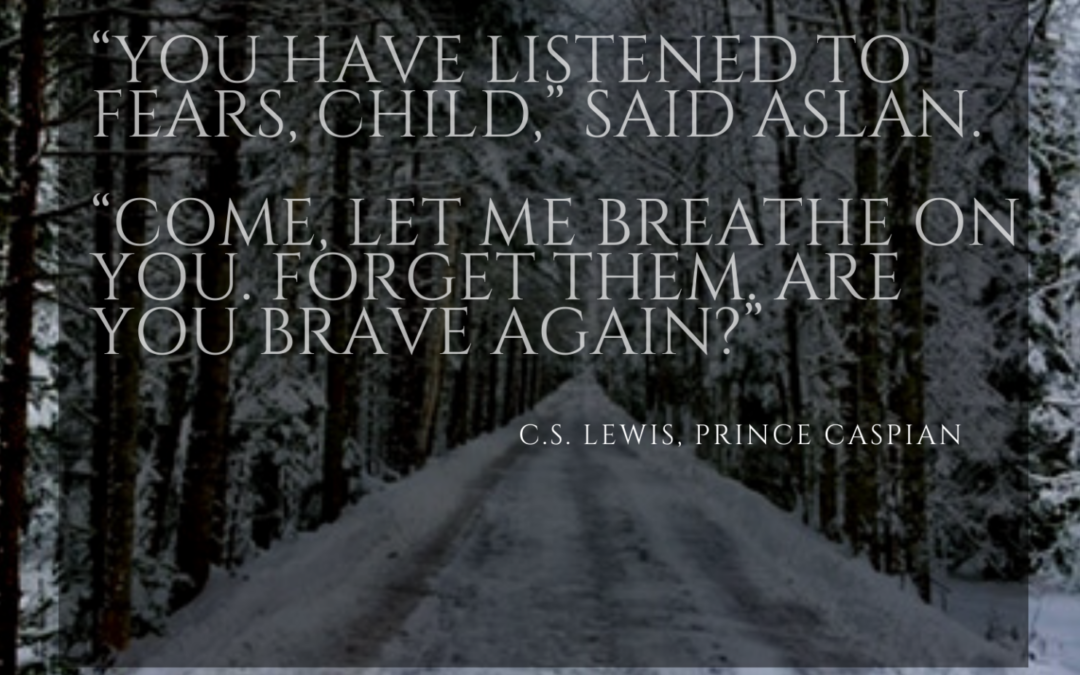“You have listened to fears, child,” said Aslan. “Come, let me breathe on you. Forget them. Are you brave again?” C.S. Lewis, Prince Caspian
I recently came across this quote and I lost my breath a little. I was startled by the truth that fear doesn’t stand a chance against Alsan. At the same time I realized how fear plays a significant role in ours lives. It can especially get stirred during times that are inherently intended to be seasons of joy.
The Christmas season is meant to be a time of anticipation and preparation for the birth of Jesus, or in our home, “Getting ready for Jesus’ birthday!” Sharing time with people we love. Helping those in need. Making it special for our children. Taking a break from the grind. However, it can also bring with it the rumblings of old times, old memories, stir up loss, bring up concerns about finances, concerns about family, concerns things may not go well.
Something we are often not aware of is that experiencing joy is vulnerable. As much as we want to feel joy, it can also make us feel exposed. It can bring up nervous feelings that something may go wrong or that it will not last. Often, times of joy can be closely followed with feelings of anxiety, worry and fear.
At the root of anxiety, is fear. One thing I have learned about anxiety and fear is, that as much as is it causes us to be scared, hesitant, irritable, or even frozen at times, it can also be a gift that alerts us to real needs. If I am in danger I need protection. If I am scared I need safety. If I am in doubt I need reassurance. It’s not wrong, bad or shameful to have fears. It is part of our experience in this life. However, when fear is identified it can be an indicator that we are in need and this can help shift us to better step into the fear with a plan. In developing that plan it is helpful to better understand some of the brain’s design to “get us safe” when the danger has been detected.
There‘s a part of the brain that is very good at detecting dangers. When it has been identified it sends the signal to the built-in “alarm system.” This system is designed to help us to “not think” in times of imminent physical danger. We experience the alarm as anxiety. Anxiety works kind of like a “danger detector” or thermometer as well. When our nervous system is overwhelmed our body is flooded with chemicals that prepare us for “fight or flight” response. This life-saving response, reserved for emergency situations, helps us to take quick action without thinking. However, when we learn more about ourselves, and our fears, we can better manage our “levels” and address our true needs because not all danger is physical or apparent.
 Because of life experiences, and even our current circumstances, we may try to ignore and stuff our fears and anxiety. But it is important to catch them as soon as we can. If we don’t, we may be at risk of the automatic system taking over. We can notice if anxiety and fear are present almost immediately through our bodies. Heart rate increases. Speech speeds up. Face gets flush. Feel more irritable. Thoughts go all over the place. We can feel like withdrawing or arguing. As distressful as these indicators can be, they are also ways for us to be alerted to our needs. When we are not in imminent physical danger, these early signals can help us to become aware it is time to take steps to get safe and identify our needs.
Because of life experiences, and even our current circumstances, we may try to ignore and stuff our fears and anxiety. But it is important to catch them as soon as we can. If we don’t, we may be at risk of the automatic system taking over. We can notice if anxiety and fear are present almost immediately through our bodies. Heart rate increases. Speech speeds up. Face gets flush. Feel more irritable. Thoughts go all over the place. We can feel like withdrawing or arguing. As distressful as these indicators can be, they are also ways for us to be alerted to our needs. When we are not in imminent physical danger, these early signals can help us to become aware it is time to take steps to get safe and identify our needs.
First, we need to get access to our “thinking brain” so we can make more clear choices. We need to cool and slow the body’s response down. One effective way of doing this is to stop and take a slow, deep breath. A slow breath delivers oxygen to the brain, “cooling it” and helps to access our “thinking brain.”
Take a slow breath, in through the nose out through the mouth.
This can be expanded into taking daily time to practice slow breathing when things are already calm. Practicing when there are no stressors, triggers or “dangers” can aid in training ourselves to use this skill when we notice that our bodies are alerting us or if the “meter is going up.”
Slow breathing does not remove the danger or the problems at hand. However, it will help to cool things down for a moment so we can think more clearly and make more rational choices. Ultimately, in the absence of immediate physical danger, it is important to make clear decisions onhow we get safe: physically, emotionally and mentally.
Next, we need to process and understand what was the trigger or cue to “setting the alarm off.”
It’s important to talk with those we know to be trusted and safe. We need to share what is going on and process so we can better understand our needs and then move to get them met.
In addition to the practical real-time skills, I believe, it is incredibly important to pray and ask for God’s help. Let Him into our anxiety, worry and fear. He is faithful to help us to better understand what is really going on and more clearly aid us in understanding that, ultimately, we need Him. God gives us joy, because He is joyful. He is the source of joy. He is also very near to us when fear comes in to try and rob our joy. He is there to reassure us that nothing is bigger than Him and His love always prevails.
Breathing skills/Relaxation Techniques:
- Sit comfortably with your back straight. Put one hand on your chest and the other on your stomach.
- Breathe in through your nose. The hand on your stomach should rise. The hand on your chest should move very little.
- Exhale through your mouth, pushing out as much air as you can while contracting your abdominal muscles. The hand on your stomach should move in as you exhale, but your other hand should move very little.
- Continue to breathe in through your nose and out through your mouth. Try to inhale enough so that your lower abdomen rises and falls. Count slowly as you exhale.
Interested in talking more with Andrew Heinz? Visit our website, or give us a call at (970) 490-1309, and we will get you set up with a free consultation with Andrew or one of our other talented counselors.
Resources:
Relaxation Techniques For Stress Relief
Stress Relief Breathing Techniques #1
Calming Worship music:
Call Upon the Lord, Elevation Worship: https://www.youtube.com/watch?v=fl1UGN2x_48
Closer Than You Know, Hillsong United: https://www.youtube.com/watch?v=QNurkymbDhc
This is How I Fight My Battles, Upper Room: https://www.youtube.com/watch?v=NoAqymNcBTk
Defender, Rita Springer: https://www.youtube.com/watch?v=FP003C5dP3k



